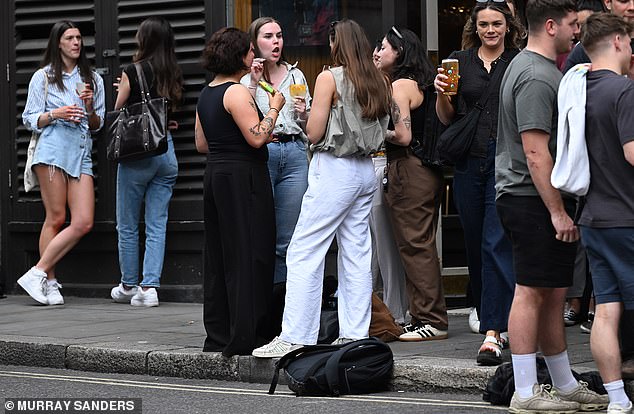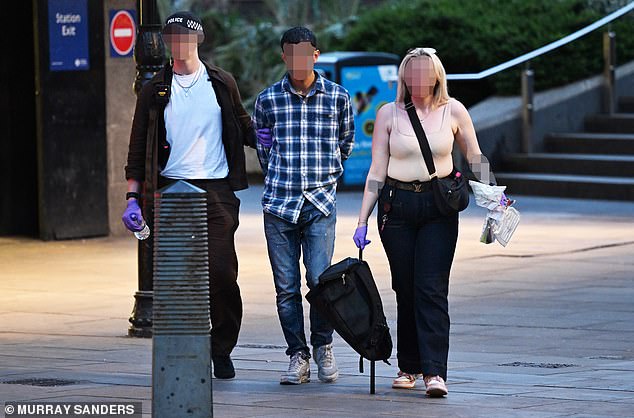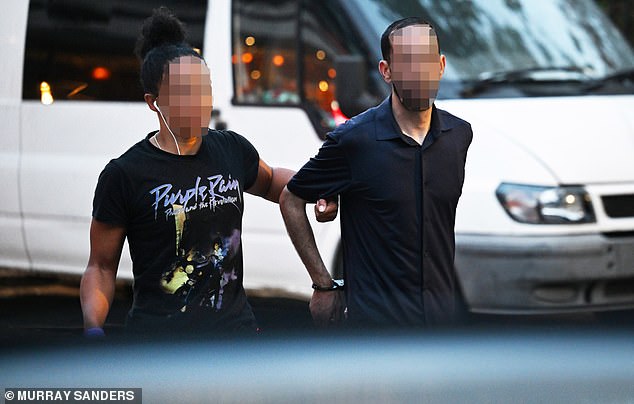Inspector Dan Green doesn’t look like a City of London policeman. He is dressed for a day at the seaside or, possibly, a music festival, in Saucony running shoes, a pair of snazzy navy blue shorts, a short-sleeved striped shirt and a baseball cap.
That’s because he is undercover, along with a dozen other police, roaming the streets of the Square Mile on a sunny Thursday evening in May.
It is 5pm and already most of the pubs are heaving, with office workers spilling onto the pavements clutching their pints of Guinness or pale ale, many of them placing their work bags casually at their feet. And that is why Green and his team are on duty – to catch bag snatchers.
Bags make great targets for criminals, especially in the financial district of London, where the starting salary for corporate lawyers aged just 24 is now an eye-popping £150,000.
‘Everyone’s going to have a laptop, everyone’s going to have probably their own phone and a work phone, probably a nice Samsung or iPhone,’ Green explains. ‘There’s likely to be some nice headphones in there, car keys.’
He leads the City’s Proactive Acquisitive Crime Team (PACT), a group of police officers who go out once every few weeks, hunting for thieves.
While the unit was set up two years ago to tackle phone snatchers, last year its focus shifted to include the pernicious crime of bag theft.
The Daily Mail has been given permission to spend the evening with Green and his team to see their experimental approach in action. Because, rather than wait for a crime to be committed and then investigating it, they mill about with crowds of after-work revellers, actively searching for criminals as they go about their work, in the hope of catching them in the act.

Thieves will target bags that have been left on pavements as workers enjoy evening drinks in London’s Square Mile
Some people may have limited sympathy for well-paid and well-oiled City workers having their work laptops stolen. But, as Green says, bag thieves are rarely opportunistic: ‘All the criminals involved will be doing all sorts of crimes. They are invariably involved in drugs and stolen goods as well.’
Just last month, Green’s team had caught a snatcher who, when his flat was raided, had 20 laptops.
How do you spot them? ‘Body language, behaviour. They stand out because if you and I are walking down the street, we would be going somewhere,’ he says. ‘These guys – there’s something different. They’re not walking with a purpose. Their eyes are continually looking around, they’re looking at people.’
It becomes immediately apparent why ‘baggers’, as Green calls them, love to work in the City. We start off in his car, a Ford Focus, driving down Farringdon Road, a wide thoroughfare that runs from Smithfield meat market down to St Paul’s Cathedral. In just a 200-yard stretch there are no fewer than six pubs or wine bars, each with drinkers spilled out on the pavement.
The City of London is a curious corner of Britain – a mix of gorgeous Wren churches, medieval alleyways and a profusion of glass skyscrapers, a new one going up seemingly every month. But, while only 8,600 people live here, 678,000 commute every day to work in the banks, law firms and consultancy offices. This explains the abundance of pubs and wine bars – more than 1,000 licensed premises, according to Green – that are rich pickings for criminals.
He explains that most thieves, like the office workers they prey on, commute into the City: ‘Criminals are creatures of habit and they will come back to pubs they know and like.’
The many transport hubs in the City help criminals just as much as commuters – allowing them to escape capture. Liverpool Street station is now the busiest railway station in the UK because of the opening of the Elizabeth Line, with 94.5million people entering and exiting the station in 2023/24, according to the Office of Rail and Road.
We park on a quiet side street and then get out to walk. The Mail photographer and I hang back, while Green and his colleague, PC Monika Furmanska, start prowling the pavements. PACT work in groups of two or three police officers, all wearing normal clothes, with Green coordinating them via radio and a hidden earpiece.
They stroll between pubs, but do not go into them, with Green explaining it tends to be easier to spot criminals when they are on the move rather than when they are standing still. Also, it is easier to steal a bag from a pavement than inside a pub itself.
By now, it is 6.30pm. The crowds are getting noisier, with customers bringing out bottles of rosé in wine coolers from the bar.

Plain clothes City of London police officers lead a suspect away
We walk down to Ludgate Circus and up Fleet Street. There’s suddenly a flurry of activity. Green and Furmanska start running down a side street towards The Harrow pub, while two other undercover police arrive on Santander bikes as back-up. It is a false alarm. They had received a report that two men, one of them wearing an ear pod, were acting suspiciously. After the police searched their bags, they were found to have taken nothing.
‘They nearly always work in twos or threes, with one acting as a lookout. The single ear pod is often a giveaway,’ Green says, explaining criminals communicate with each other by using Bluetooth headphones.
We move on to Watling Street, part of an old Roman road that traversed the ancient capital and is now a pedestrianised thoroughfare. It is so heaving with drinkers that I have to raise my voice to be heard, even outside. It is now 8.15pm; the Core Bar has attracted a particularly large number of younger drinkers, mostly in their early 20s, thanks to its Happy Hour offer of £7 steins – a double pint.
I chat to Max and Rob, both 21-year-old economics students on work placements, one at consumer goods giant Unilever and one at the Bank of England. They, like so many, are standing loosely around a pile of their bags, drinking their steins of lager. Are they worried about theft? ‘You’d hope one of us would notice if someone came and nicked one,’ says Max. ‘But after four hours of drinking, who knows?’
Green signals to me to return to the car. He has heard from a colleague that a pub has reported a bag snatch near London Bridge. I hear the message over the radio: ‘IC one male in flat cap; IC four female in bucket hat.’ IC stands for identity code, with each number corresponding to an ethnicity – one being white, four being Asian – a short-hand for when police are in a rush. ‘They’ll wear any type of headgear that helps disguise their identity,’ Green says, explaining that they often keep an eye out on anyone wearing a hat. ‘We’re drawn to hats.’
But before we can get to London Bridge, another call comes through. Green ‘blue lights’ down Cannon Street – turning on the emergency lights incorporated into his Ford Focus – as we weave through traffic at 45mph to get to the scene.
The report over the radio is sketchy, but we arrive at Tower Hill tube station to see two men being led out of the station by some plain clothes police.
Both are foreign nationals, aged 36 and 28. The older one, as he is being handcuffed and put into Green’s car, has good enough English to say to the officer: ‘I’ll spit in your f***ing face.’
Transport for London staff in Tower Hill tube station had seen them acting suspiciously, attempting to use various debit cards to get through the ticket barriers. The staff had called the City of London Police, informing them that the suspects were waiting on the platform for an underground train and there were four minutes until the next tube.

Another suspect is taken away by an officer after being arrested for bag snatching
Two of Green’s officers, around the corner, rushed to the station and one officer immediately spotted that one of the suspects had been involved in a previous bag snatch. He recognised him from CCTV back in February. Arrests were being made as we arrived.
One of them had a black bag containing nothing but two laptops. Another had a black Lululemon backpack containing a wallet along with other personal items that didn’t belong to him.
The suspects are taken back to Bishopsgate Police station along with the bags. The police get to work on trying to figure out where and from whom the bags have been snatched.
The bag with the laptops offers few clues, but when they open one of them it has not been fully shut down, so it says: ‘Henry’s laptop’.
Inside the Lululemon bag there are more clues, including a handwritten card to ‘Daisy’ from one of her kindly neighbours, welcoming her to her new block of flats. It includes his telephone number. The police call the neighbour and explain they are trying to get hold of Daisy, the owner of a stolen bag; he gladly gives them her number. The police then call Daisy, 30.
It’s now 9.30pm. Daisy takes up the story: ‘I was still at the pub, the Running Horse, in Aldgate and the police called me, and I thought it was my colleague playing a prank on me at first. But then they asked if I was with a “Henry” and that his laptop had been taken and I realised it was for real.’
The police had – correctly – presumed they were colleagues drinking together. Both work for a large marketing agency nearby.
As ‘Thursday is the new Friday’, according to Henry, a group of about 40 colleagues all went to the Running Horse at 5pm. It’s a modern pub on the ground floor of an office building, but has a small outside area with a patch of grass.
‘We go there because it’s such a suntrap,’ says Henry. ‘It was a glorious sunny evening. And, as usual, we put our bags onto the floor into one big pile.’
He was standing just two yards from the pile when the police called Daisy. She tells him the news his laptop has been stolen, but he could see his bag still in the pile. It’s only when he goes to check, that he discovers someone has undone a clip on his bag, put their hand in and taken out his laptop.
‘It was obviously a bit of shock,’ he says. His next emotion was ‘embarrassment’ that it had been taken from under his nose. ‘I can’t believe it’s happened to me. How can I be so careless?’
Daisy says she was very worried about a personal possession inside her bag: a Burberry scarf that belonged to her grandfather, who died a year and half ago. ‘It’s just a scarf, and it’s moth-eaten, and I have a million memories of him, but it made me feel helpless at the idea it would have been tossed into a bin or sold on eBay for a tenner.’
Both of them say they were then relieved and thrilled to discover the police not only had recovered their items, but were going to come to the pub to return the bags and to take statements.
Daisy says: ‘I would have been devastated and very stressed to find my bag had been stolen. But I was impressed at the swiftness of the police and their willingness to come to reunite us with our stuff.’
She adds, however, that it is another reminder that living in London, you are never far from a criminal. ‘It’s really sad. I love London, I think it’s the best city in the world. Only last month I ran the marathon and it was London at its best.
‘But it’s really, really awful that you end up not trusting anyone. What a sad, sad way to live.’
Between the start of the year and the end of April, 247 thefts from licensed premises in the City of London had been reported. This works out at two a day – down from the total of 313 reported in the same period last year. It certainly suggests that the PACT unit is making a difference. Old-fashioned policing, with officers out on the street, can help reduce crime.
But as Daisy and Henry’s experience shows, wherever there is a bag containing a valuable laptop or phone, there is almost certainly a criminal not far behind.












